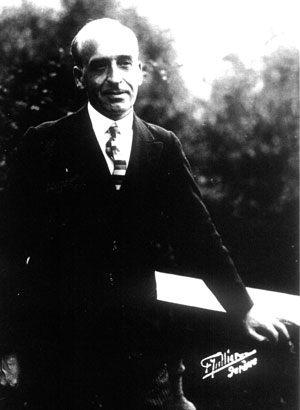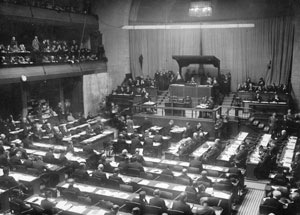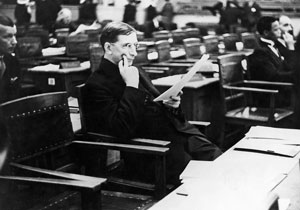By Michael Kennedy

In December 1922 the Irish Free State came into being. Within months it had applied to join the League of Nations, the multilateral organisation created by the post-war Paris peace conference in April 1919 to oversee international security and disarmament. The idea of the League of Nations arose from US and British visions of a new global order after the First World War, most famously from those championed in the ‘fourteen points’ of US President Woodrow Wilson (though ultimately the US never joined the League). Based in Geneva, the League was a direct response to the First World War, as it was tasked with ensuring that there would be no recurrence of such a devastating global conflict.
A DEMAND OF THE FIRST DÁIL IN 1919
Admission to the League had been one of the demands of the first Dáil Éireann in 1919, but it was not until December 1922, when the Irish Free State formally came into existence internationally, that it was possible for Ireland to apply for membership. The Irish Free State joined the League on 10 September 1923. Michael MacWhite, a former member of the French Foreign Legion who had been part of the Irish team seeking admission to the Paris peace conference, took up the post of Ireland’s Permanent Delegate to the League.
Irish membership of the League of Nations was of great significance. While the British–Irish relationship was of paramount importance for the new state, Irish participation in the League of Nations was also shaped by the desire to carve out an international niche distinct from the British sphere of influence. Under the 1921 Anglo-Irish Treaty the Irish Free State was a dominion in the British Commonwealth. As such, it was, in Britain’s view, to follow the views of London internationally. Dublin disagreed with this, and the Irish Free State sought to assert its international sovereignty through membership of the League of Nations. Despite British protests, the lodging of the 1921 Anglo-Irish Treaty as an international treaty at Geneva in July 1924 achieved this objective.

VALUE FOR MONEY
League membership allowed Irish diplomats to engage with the representatives of over 50 states in an international forum through one diplomatic mission in Geneva. For a small state with a small diplomatic service, such international organisations offered value for money. Ireland would otherwise have had no relations with many states, including those with which it had much in common. While Ireland was not overly active in the initial years of its membership, this changed in 1926 when Germany joined and a contentious attempt was made to expand the League’s Council (the equivalent of today’s United Nations Security Council) to include Germany and other states. Ireland stood for Council membership to upset an obviously arranged election.
While the effort was unsuccessful, the experience showed what Irish diplomats could do at Geneva with just a little effort and some international goodwill. From 1927 onwards Dublin made active support for the League of Nations a key plank of its foreign policy, signing League social and economic conventions, embracing its codification of international law and supporting the League’s ideal of a peaceful international system through collective security and disarmament. Universalist principles were articulated by the League and often supported by Ireland, such as in the 1926 convention to suppress the slave trade, which Ireland signed in 1930.
ELECTED TO THE LEAGUE’S COUNCIL IN 1930
With such visible support for the League at hand, in 1929 the Department of External Affairs began seeking international support for Ireland’s election to the Council in 1930. Ireland stood as a representative of small and powerless members against the ‘Great Powers’ (in particular Britain and France) on the League Council. It worked. On 17 September 1930 the Irish Free State, a League member only since 1923, was elected to the League’s top table by its international peers. The guiding forces behind Ireland’s new-found assertiveness at the League in the second half of the 1920s were Minister for External Affairs Patrick McGilligan and Minister for Finance Ernest Blythe. Blythe became the first Irish delegate to take the state’s seat on the League Council as Ireland began its three-year term. McGilligan or Ireland’s Permanent Delegate, Seán Lester, took the seat thereafter in the first years of Ireland’s Council term.
DE VALERA AN ACTIVE PARTICIPANT
The years from 1930 to 1935 were Ireland’s heyday at the League of Nations. In 1932 Cosgrave’s Cumann na nGaedheal lost power to Éamon de Valera’s Fianna Fáil. De Valera now became President of the Executive Council and also Minister for External Affairs. He became the dominant intellectual force behind Irish foreign policy through the 1930s and 1940s, though he built his vision of Ireland acting independently upon the activities of Cumann na nGaedheal in both the Commonwealth and the League of Nations. De Valera, in contrast to his austere image in Ireland, enjoyed the cosmopolitan atmosphere of Geneva and was a popular and respected international statesman in 1930s Europe. He addressed the League’s General Assembly yearly and often represented Ireland on the Council during the final year (1933) of the state’s three-year term on that body.
Membership of the Council, the League’s highest body, gave Irish diplomats opportunities to engage with global problems that rarely otherwise involved Ireland—from the operation of the League’s mandates in Africa to public health issues in less-developed countries and the 1931 Japanese invasion of Manchuria in China. Ireland’s Permanent Delegate to the League, Seán Lester, supported efforts to penalise Japan for invading Manchuria despite instructions from Dublin that, notwithstanding its actions, Japan was to be supported as a bastion of anti-communist stability in the East.
Ireland’s term on the League’s Council ended in September 1933, but by the middle of the decade Ireland was marked out as a League supporter. Indeed, in 1934, when the League sought to oversee a plebiscite in the Saarland, a League-run territory between France and Germany, de Valera was approached to see whether Irish Defence Forces personnel could be deployed to join an international force policing the vote. He agreed, even though the Irish troops would be under British command. Dutch troops were ultimately called on instead, but this was a ground-breaking call on the still relatively new Irish state’s military forces. This, and Seán Lester’s secondment to the League’s secretariat as its high commissioner in the ‘free city’ of Danzig (today’s Gdansk) in Poland between 1934 and 1937, illustrated Ireland’s potential and actual role as a ‘middle power’ in the League.
FRACTURING BY THE MID-1930S

From Danzig, Lester offered those who would listen evidence of what Nazism ultimately would lead to in Europe. Few took more than cursory notice of his warnings. By the mid-1930s the hopes for international order encapsulated by the League were fracturing. Italian forces invaded Abyssinia on 3 October 1935, and the League’s inability to counter Italy’s military aggression against a fellow member showed that its system of collective security had failed.
Ireland loyally implemented League of Nations sanctions against Italy, despite there being considerable Irish public and parliamentary sympathy towards a Catholic country supposedly bringing civilisation to what was perceived in some quarters to be a backward and pagan country. The League’s ineffectual response to the Italian invasion did, however, give rise to a perceptible feeling in Dublin that the League of Nations had failed outright in its essential task. In a debate on the Abyssinian crisis at the League assembly in July 1936, de Valera warned that ‘all the small states can do, if the statesmen of the greater states fail in their duty, is resolutely to determine that they will not become the tools of any great power, and that they will resist with whatever strength they may possess every attempt to force them into a war against their will’.
De Valera remained a supporter of the League despite its failure in Abyssinia, but after 1936, as the European powers used the civil war in Spain as a proxy conflict, Ireland began quietly to shift towards greater self-reliance in international affairs. By the late 1930s a European war was on the horizon; on this key issue the League had failed. Geneva nevertheless continued to serve as Dublin’s continent-wide European listening-post. Reports by Lester’s successor in Geneva, Francis Cremins, also identified the expansionist and militaristic intentions of a resurgent Germany under the Nazis as potentially the greatest destabilising force in Europe.
DISENGAGEMENT
Ireland essentially disengaged from the League of Nations once the Second World War broke out, though it remained a member. The Irish office at Geneva was closed in 1940 and Cremins was transferred to Berne as Ireland’s first representative to neutral Switzerland. Seán Lester, who was still seconded to the League from the Department of External Affairs, remained in Geneva through the Second World War and served as the last Secretary-General of the League. In 1946 he oversaw its dissolution and the handing over of its assets to the recently founded United Nations in 1947.
Ireland’s 23 years of League membership proved a valuable experience for the young state. It gave an entrée to the international system at what was, for the time, a truly global level. Ireland valued the League’s message of peaceful international co-operation and international activism, and the League’s core goals chimed with those of Ireland’s emerging foreign policy. Many of the Irish diplomats who were involved in the League’s work or attended the League’s annual assembly went on to have significant careers in multilateral diplomacy, including at the United Nations, which Ireland joined in 1955, and brought their experience of Geneva with them. The League of Nations was the first multilateral organisation joined by independent Ireland; it would not be the last.
Michael Kennedy is Executive Editor of the Royal Irish Academy’s Documents on Irish Foreign Policy (DIFP) programme.
Further reading
G. Finnegan, The Irish influence: building the League of Nations and the International Labour Organization (Belfast, 2023).
J. Gibney, M. Kennedy & K. O’Malley, Ireland: a voice among the nations (Dublin, 2019).
M. Kennedy, Ireland and the League of Nations, 1919–1946: international relations, diplomacy and politics (Dublin, 1996).
G. Keown, First of the small nations: the beginnings of Irish foreign policy in the inter-war years, 1919–1932 (Oxford, 2016).
